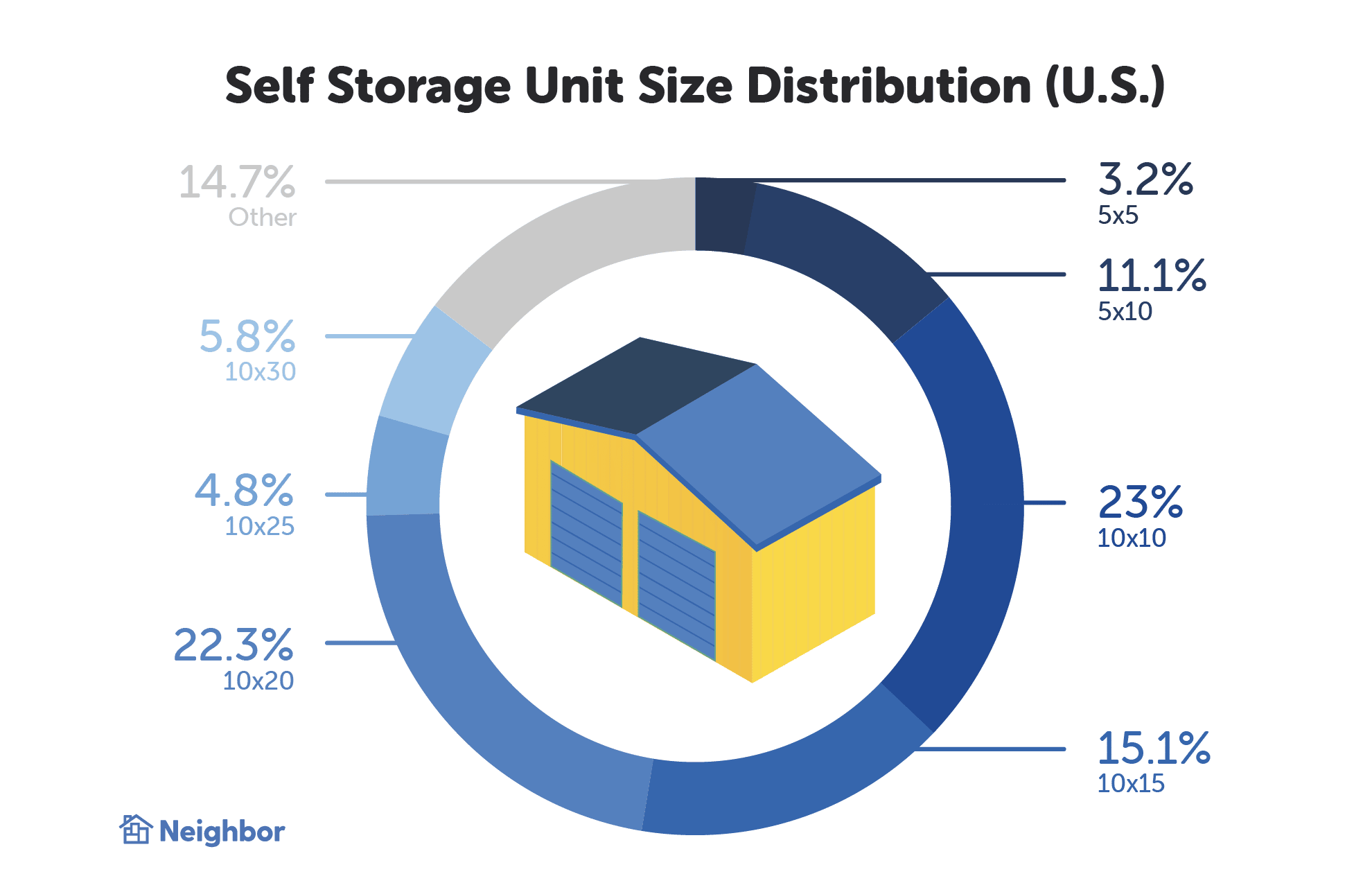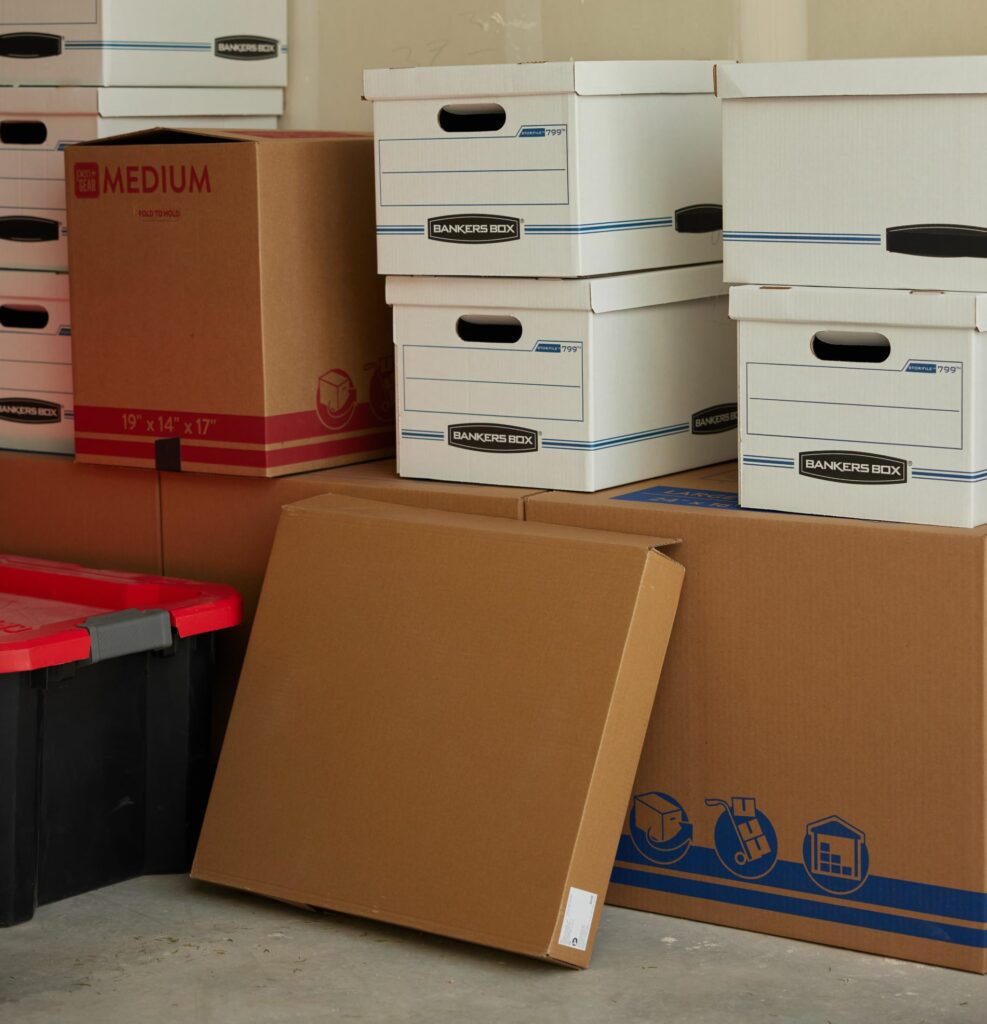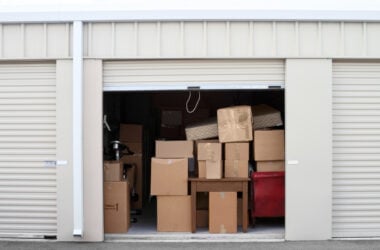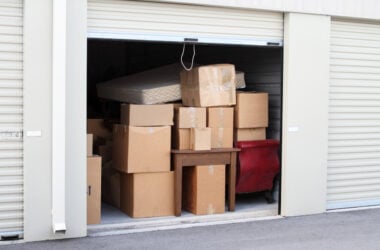Do you have personal items you can’t get rid of but don’t have space for them at home? Are you desperately wanting to store some of your belongings in a storage unit but frightened by the idea of another monthly expense? Maybe you’ve already assumed that you can’t afford a storage unit, especially if you’re looking to store oversized furniture that would call for a larger (potentially pricier unit).
Well, what if we told you that’s not necessarily the case?
See, when you understand the cost of storage units and how to get the best bang for your buck, you can make sure you’re paying reasonable storage unit prices (for a unit you can actually afford).
If you’re looking to rent a storage unit, there are a lot of factors to consider: size, facility type, climate-controlled vs. standard, and cost. Of all, cost is probably at the top of your mind. So, what storage unit prices can you expect?
How Much Does It Cost to Rent a Storage Unit?
When looking to rent a storage unit, your first thought might be, “How much is a storage unit?” And while it would be ideal to have a one-size-fits-all answer to this inquiry, the truth is that the cost of a storage unit is not only determined by the size of the unit. Keep in mind that numerous factors influence the total price.
However, let’s start by exploring the average cost of storage units based on size.
Since storage units are often rented on a monthly basis, and per-month storage rates vary depending on the size of the unit, this is a good place to begin.
- The average storage rental price for a standard storage unit typically ranges from $60-$180 per month.
- The average storage rental price for a climate-controlled storage unit typically ranges from $75-$225 per month.
Average Storage Unit Price by Size
It’s clear that storage rates vary widely, and this is because price varies based on square footage. So, to better understand what you can expect to pay, it’s recommended you check out units of similar sizes that are offered through different facilities. From there, compare prices between units with identical square footage.
Before you look at the average storage unit prices, remember that the price of storage units may vary from one facility to the next. For example, a 5’ x 5’ storage unit at Facility A might cost $60 per month, while a unit of the same size at Facility B may cost $80 monthly.
With that in mind, here are some of the most common monthly storage unit prices based on size:
- 5′ x 5′ storage unit: $74.40
- 5′ x 10′ storage unit: $146.40
- 10′ x 10′ storage unit: $203.20
- 10′ x 15′ storage unit: $285.60
- 10′ x 20′ storage unit: $313.40
- 10′ x 25′ storage unit: $394.40
- 10′ x 30′ storage unit: $574
- 20′ x 20′ storage unit: $695.33
Storage Unit Sizes: A Price Comparison
The size guide below provides what you should expect to pay for different storage options. The units are in square feet, and you can expect to pay higher prices for larger units.
| Size (sq. ft) | 5’x5′ | 5’x10′ | 10’x10′ | 10’x15′ | 10’x20′ |
| Average Monthly Price | $60 | $70 | $110 | $130 | $180 |
| Climate-Controlled Average Monthly Price | $75 | $88 | $138 | $163 | $225 |
| What Fits | Several boxes or furniture items, seasonal items, or college summer storage. | Studio or small 1-bedroom apartment items. | Small 2-bedroom or larger 1-bedroom apartment items. | Larger 1-2 bedroom house items, a compact car, or small recreational toys. | 3-4 bedroom home items or a standard-sized vehicle. |
Other Factors That Determine Cost of Storage Units
To determine the storage unit rate that you will likely pay, you’ll need to take several factors into consideration. Depending on these factors, you may be paying slightly more or a little less than the average storage unit cost:
- Facility type
- Location
- Size of unit
- Seasonality and availability
- Insurance
- Climate control
- Duration of occupancy
- Level of service
- Security deposit and administration fees
- Specials or add-ons

Facility Type
The type of self storage facility that you rent from will affect the price. As you explore your options, you should be mindful of the types of rentals that are available:
- Managed storage — A crew of movers gathers your belongings and delivers them to a storage space for you.
- Self storage — This option gives you access to a secure rental unit, but you are responsible for moving and storing your belongings.
- Peer-to-peer storage — Peer-to-peer storage options are a fraction of the cost of traditional rental options. You can use a peer-to-peer platform like Neighbor to find this type of storage space.
Not sure what kind of storage unit to get? Use our guide on types of storage units to help you choose the perfect solution for your needs.
Location
Your storage location can drive up your storage unit price. Public storage facilities in urban areas are often more expensive due to high demand. However, you may be able to save money if you’re willing to drive further to use a storage unit in a less populated area.
Size of Unit
Before deciding on a storage unit to rent, think about how much space you need. Take the time to calculate the square footage that your items will take up, and be as precise as possible so that you don’t end up wasting any space. You should also learn how to organize the unit efficiently to maximize every square foot.
Here’s a breakdown of what some of the most common storage sizes are similar to:
- 5’5′ — A walk-in closet.
- 5’x10′ — A small studio apartment.
- 10’x10‘ — A large one-bedroom apartment.
- 10’x20′ — A one-car garage.
- 10×30 — A one-and-a-half car garage.
Figure out the perfect amount of square footage by consulting a comprehensive storage size guide.
Seasonality and Availability
Did you know that self storage prices are often lower in the winter? Approximately 80% of moves in America occur between the months of April and September, which increases the demand for storage during spring and summer. So, if possible, think about waiting to rent storage during lower-rate seasons.
Insurance
Most traditional storage facilities require you to protect your possessions with some insurance coverage.
If you have renters or homeowners insurance, your policy might cover a certain percentage of your storage unit costs. However, if your policy does not cover storage (or if you don’t possess either form of insurance,) you may have the option to purchase insurance through your storage facility.
Just keep in mind that not all facilities offer insurance. Also, if you are able to opt for storage insurance, know that the cost of the insurance premiums will be added to your monthly storage unit price. If the storage unit center does not offer insurance, you can always inquire about affordable protection plans.
Protect your stored belongings using our storage insurance guide for navigating the type of coverage you need.
Climate Control
Some items that could sustain damage in traditional storage conditions can benefit from a climate-controlled storage unit. Here are five main benefits of a temperature-controlled storage unit:
- Regulates humidity levels and maintains consistent temperatures
- Provides enhanced security measures, like surveillance cameras and security personnel
- Preserves the quality of items and valuables
- Lowers the risk of mold and mildew growth
- Promises a comfortable environment all year long
Do note that temperature-controlled storage unit prices are always higher than non-temperature-controlled units. In fact, one of the biggest price factors that set similarly sized storage units apart is climate control.
You can generally expect storage unit rental prices to fall within these storage industry standard averages:
- Standard storage unit: $60-$180 per month
- Climate-controlled storage unit: $75-$225 per month
Find climate-controlled storage near you.
Duration of Occupancy
The length of your rental contract can affect your storage unit price. While many storage facilities typically rent out storage units on a month-to-month basis, some locations still impose a minimum rental duration requirement of three months on average.
Before you sign your contract, make sure you ask about a minimum rental duration. Also, inquire about discounts on long-term contracts.
Security Deposit and Administration Fees
Each storage facility will have different security deposit requirements. Ask about the fees you should expect to pay when renting a storage unit from a specific location. While these are typically upfront costs, administration fees can be monthly charges as well.
Whether or not you’ll pay a security deposit has everything to do with the policies of the facility you want to rent from, so asking them directly is key. On the bright side, even if the facility does require you to pay a security deposit, it is typically refundable as long as you do not damage the storage unit.
Specials or Add-Ons
Before you agree to a storage unit rental contract, ask the facility if they have any specials or add-ons. For instance, some locations offer the first month free. Others are willing to provide you with storage bins, packing supplies, padlocks, labor assistance, 24-hour access, and drive-up access for no extra costs.
How to Choose the Best Storage Unit

As you think about which storage unit is right for you, consider what is most important to you. What do you value most? Are you more concerned about climate-controlled environments than the total price?
Maybe you would prefer to keep your costs low in exchange for a smaller unit or a less desirable location. Ultimately, only you know what you are willing to compromise on, so take some time to reflect on your preferences before making your final decision.
Affordable Monthly Storage Rates With Neighbor
When it comes to storing your possessions, there’s theoretically no price that you would put on the protection of your belongings.
At the same time, affordability is still an important piece of the puzzle. By searching peer-to-peer marketplaces like Neighbor for self storage units in your area, you can be sure to find a facility that not only accommodates your budget but exceeds your expectations as well. Oftentimes, renters who go through peer-to-peer platforms pay 50% less than units in storage facilities.
| Unit Size | Average Monthly Price on Neighbor | Average Monthly Price at Storage Facilities |
| 5’x5′ | $20 | $60 |
| 5’x10′ | $26 | $70 |
| 5’x15′ | $50 | $90-$100 |
| 10’x10′ | $42 | $110 |
| 10’x15′ | $44 | $130 |
| 10’x20′ | $72 | $180 |
| 15’x15′ | $100 | $183 |
| 20’x20′ | $105 | $150 |







